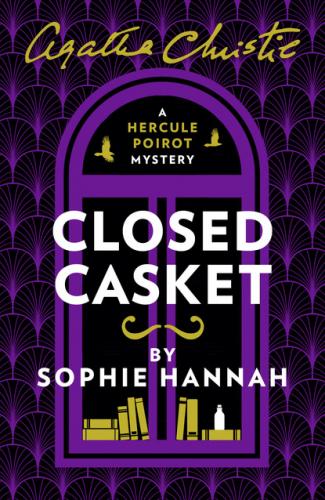‘You describe it very well,’ said Poirot. ‘However, it was not the announcement of the new will that upset Mr Gathercole. Remember, he had known for some hours and was perfectly composed when we all sat down at the table. So what altered his mood?’
‘I’ve been puzzling over that very question,’ I said. ‘What happened that he might not have been prepared for? I suppose Scotcher’s reaction was unexpected: he did not seem glad of the new arrangements at all, did he?’
‘Understandably, he did not. Scotcher is close to death. What can he gain from this new will? Nothing. He will not live to see the money, so it spells only trouble for him—resentment from Dorro, from Claudia … which is why I wonder.’
‘What do you wonder?’
‘Lady Playford’s intention—perhaps it is not to benefit Scotcher but to incommode him. To cause him distress and inconvenience. That, after all, is the effect that we observed, and Lady Playford seems to be a person whose aim would not miss.’
‘What if she and Joseph Scotcher have jointly concocted some kind of plot?’ I said.
‘Why do you suggest it?’ asked Poirot. We had reached the far side of the lawn, the spot that offered the best view of Lillieoak. People were supposed to stop here and admire the house.
‘Oh, I don’t know. It’s only that their behaviour struck me as similar somehow. Lady Playford leaves everything to a dying man who will not benefit from her generosity. Joseph Scotcher proposes marriage to a girl who, if she accepts him, will get deathbed duty instead of the romantic dream, before becoming a widow. In both cases, the promise of everything—one’s dreams come true—but a vastly different and more desolate reality.’
‘That is an interesting observation,’ said Poirot as we walked on. ‘Yet I can imagine the desire to marry the one you love growing more urgent as life departs. There is great consolation in the symbolic union.’
‘What if Nurse Sophie ends up with the lot?’ I said.
‘While I think of the grand romantic gestures, you think of practicalities, n’est-ce pas?’
‘You have not considered it? If he marries her, and Lady Playford dies before he does, to whom would her estate go? To Sophie, as Scotcher’s wife.’
‘Catchpool. What is that noise?’
We stopped. It seemed to be coming from the bushes to our right: the distinct sound of a person weeping that soon gave way to an intermittent hissing noise.
‘What on earth is that?’ I asked Poirot.
‘Frenzied whispering. Lower your voice, or they will hear us, if they have not already.’
It was obvious as soon as he said it that the hissing I had heard was the sound of a frightened person trying to communicate quietly but urgently.
‘There must be two of them out here,’ I whispered. ‘Shall we look for them?’
‘In these gardens?’ Poirot made a dismissive noise. ‘It would be more profitable to look for a particular leaf—the first one you saw when you arrived here.’
‘People are easier to find than leaves,’ I said.
‘Not when you and I are strangers to these paths and others are not. No, we will return to the house. There is work for us to do. We must make ourselves busy. Once we are inside, we will be able to see who is there and who is not. That is more productive than looking for the needle in the hay.’
‘What did you mean about us having work to do?’ I asked. ‘What sort of work?’
‘I know now why we were invited here, you and I. It was not for our congenial company. Non, pas du tout. We are here to use our little grey cells. It is all part of Lady Playford’s plan.’
Before I had a chance to ask ‘What plan?’ Poirot added quietly, as if as an afterthought, ‘We are here in order to prevent a murder.’
Конец ознакомительного фрагмента.
Текст предоставлен ООО «ЛитРес».
Прочитайте эту книгу целиком, купив полную легальную версию на ЛитРес.
Безопасно оплатить книгу можно банковской картой Visa, MasterCard, Maestro, со счета мобильного телефона, с платежного терминала, в салоне МТС или Связной, через PayPal, WebMoney, Яндекс.Деньги, QIWI Кошелек, бонусными картами или другим удобным Вам способом.
